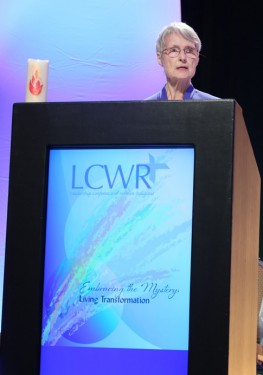By Andrew Nelson

ATLANTA (CNS) — Two keynote speakers addressed the Leadership Conference of Women Religious assembly in Atlanta about keeping grounded and the mystery found in a changing world.
Sister Pat Farrell, of the Franciscan Sisters of Dubuque, Iowa, an LCWR past president, spoke of centering religious life leadership in contemplation.
Margaret Wheatley, author and management consultant, urged members to push back against a current of reactive thinking.
The Aug. 9-12 assembly drew nearly 800 participants under the theme of “Embracing the Mystery: Living Transformation.”
All of the speakers pointed to the need for contemplative engagement with the struggles and sufferings of the world.
In her keynote, Sister Pat said that on a personal level, contemplation is “transformative” and on a communal level it is “transformational leadership.”
She spoke of centering religious life leadership in contemplation, describing contemplation as “a response to the movement of Spirit that has been stirring in and among us for some time now, becoming increasingly manifest.”
She said when she was given “the gift of time and space for contemplation,” she “found it transformative.”
Leaven to Transform
“I knew that it was not for myself alone, like some private spiritual fitness program for personal enlightenment,” Sister Pat said. “What emerges in any one of us comes as gift from beyond, as leaven given to transform the whole, and in fact has the power to do that.”
Congregations are “facing critical situations that call for long-range planning for structural, organizational, financial and logistical issues,” Sister Pat said.
Today’s “task-oriented culture makes it easier for many people to deal first with the more concrete and tangible realities,” she said.
But to enable members “to speak together from a contemplative depth,” there must be a focus on what is less tangible, that is creating processes and designs “that tend the inner collective life of the congregation,” Sister Pat said.
Constant Reactivity
In her address Aug. 10, Wheatley told the assembly: “We are living in a time of constant reactivity. I can say confidently, thinking has disappeared from leadership. Reactivity is at an all-time high.
“The feedback from leaders is ‘Tell me what to do, I don’t have time to think.’ That’s offered as a legitimate excuse. It’s OK to say, I am no longer thinking, I am just doing stuff.”
Taking the time to consider choices and contemplation is not withdrawing from the world, she noted. It shows wisdom, she said, instead of reacting to crisis after crisis.
“One person called us ‘future eaters.’ We are eating the future by our unwillingness to use our great human capacity to put thought, and reflection, and contemplation, and working with mystery, which then does provide us solutions, right action. We know what to do.”
The history of Christian women mystics shows an experience of clarity, rapture and complete confidence found in prayer, she said, encouraging her listeners to deepen their prayer life.
“We are not going to solve the overwhelming terrifying moments of this time. They have their own momentum. That is not a depressing statement for me any longer,” she said.
Religious women live a vowed life, which is their strength in times of turmoil, she said. Quoting Trappist monk Thomas Merton, Wheatley said, “We are called to this work by God. We are only being used by God, and who knows about the results.”
“In order to be the people who can be the presence of God, the presence of spirit, the presence of peace, we have to take prayer very seriously, we have to take surrender as the path, and we have to take contemplation and reflection and contemplative prayer as the means to go deeper and deeper into this surrender to mystery. And that leads to an incredibly blessed life,” she said.
Nelson is a staff reporter at The Georgia Bulletin, newspaper of the Archdiocese of Atlanta.
